originally posted at https://canmom.tumblr.com/post/162480...
The story so far
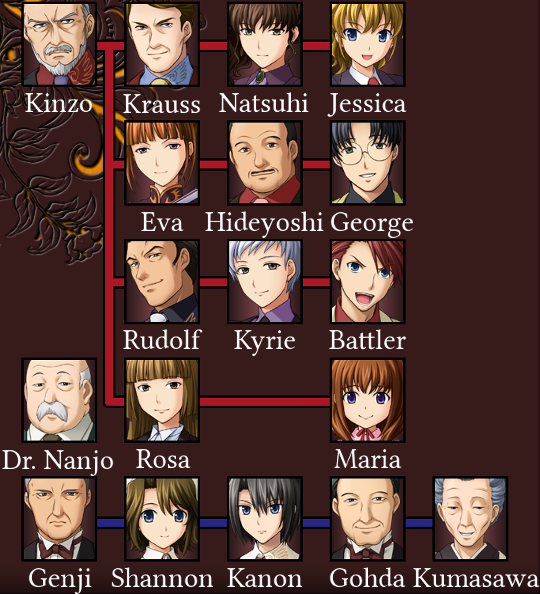
Various members of the ludicrously wealthy Ushiromiya family have gathered on their family’s remote island for the annual ‘family conference’. Family patriarch Kinzo is dying, his vast fortune is up for division and all his children want a piece. Kinzo himself doesn’t care, despising his children and now only obsessed with seeing the smile of the mythical witch Beatrice one more time.
Among the servants of Kinzo, the youngest, Kanon and Shannon are finding them scapegoated and abused by both the other staff and their employers. Kind old Kumasawa is the only member of the staff who’s sympathetic, but she says she can only observe the heartbreaking situation.
Eva, her husband Hideyoshi, and her brother Rudolf, with tacit support of her sister Rosa and Rudolf’s wife Kyrie, have accused eldest brother Krauss of embezzling funds from Kinzo to cover business losses. Krauss’s wife Natsuhi, whose status in the family is much less secure since she is a woman and not a direct descendant, reacted furiously to the accusations, and as a result has been attacked so viciously by Eva she fled the room in tears. Kumasawa once again says she can only observe.
Meanwhile, blissfully unaware, their children Battler, George, Jessica and Maria are on their way down to the beach…
Notes from my friend…
My friend added some context to the history of the Ushiromiya family discussed in the last post…
the meiji era in particular is a turning point in japanese history. prior to this, during the bakumatsu (a civil war between those who wanted japan to remain isolated and those who did not, and felt that the Emperor one way or another was being taken a fool, and resulted in part in the move of the capital from Kyoto to Edo (present day tokyo)) the west was seen as a horrific threat to japanese culture
you may have heard of the shinsengumi and/or the ishin shishi; these are two of the most familiar patriotic groups during the bakumatsu. shinsengumi were pro isolation and remaining in kyoto, while the ishin shishi were for opening borders. contrary to popular western storytelling, the shinsengumi weren’t anti-emperor
the ishin shishi as you might have guessed, won. the borders opened, the capital moved, and japan essentially began to catch up with the west
this time frame would have been IMMENSELY lucrative for any merchant class family, which is where this ties into your liveblog
during meiji, the status quo was upended. no longer were samurai the social elite, but merchants, especially those who were able to procure new western novelties and technologies
even if they had to take out a loan soon after, they would have experienced an economic boom prior to that and likely helped secure their loan
^^;’
i don’t particularly know much about the era before the bakumatsu or after meiji, at least not from a japanese perspective, but their family is a long line of merchants who were respected, and likely increased that during and after meiji
Beach times!
On their way out, Battler once again notes the portrait of Beatrice, and the long ‘disturbing’ epitaph written underneath. They speculate it’s a cryptic riddle towards the location of the family’s hidden gold, and that Kinzo will give up the head status and gold to whoever solves it.
Battler relates a story of how Kinzo raised his funds and gained trust of other capitalists in the first place: “One fateful day, I encountered the Golden Witch Beatrice.” Kinzo claimed to have summoned her through his research into magic and demon-summoning, and exchanged his soul for fortune and honour. Beatrice gave him ten tons of gold, which he could use as collateral on his loans. This gold is still said to be hidden somewhere on the island.
There follows a discussion of the plausibility of a sponsor, whether ten tons was actually ten kilograms, and the market price of gold. Then on how much the fortunes they discuss are actually worth. Battler says in narration that a lifetime’s wages are 200 million yen, and ten tons of gold - estimated at 20 billion yen - would be worth 400 years of wages assuming the portion of life spent working is 40 years.
In short, they conclude that it’s unlikely that so much gold would be sitting in one place, and speculate the ‘witch’ of the story was just a very wealthy woman, whose ‘magic’ was just her ability to predict Kinzo’s success and possibly guide his investments such as funding the Korean War. George even speculates that the name Beatrice is a modification of her real name by the West-obsessed Kinzo.
Battler ruins this otherwise fairly interesting discussion with another creepy sexual harassment joke.
Maria is not best pleased with the dismissal of witches.
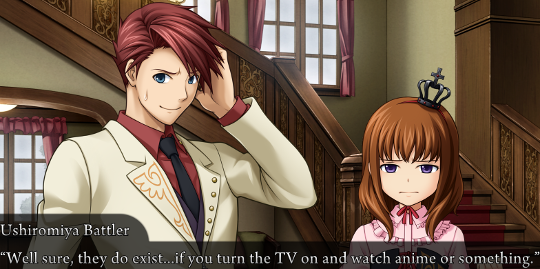
I was curious about chronology here, and it turns out, in the 1980s, Japan was in an ‘anime boom’. Notable shows in the few years up to 1986 included a lot we now call classics, such as Nausicaa, Dragon Ball, Super Dimension Fortress Macross, and Mobile Suit Zeta Gundam.
As far as witches are concerned, Kiki’s Delivery Service would be released a few years later in 1989, but magical girl anime was well established by this point: the first magical girl anime apparently dates back to the 60s. Wikipedia mentions that in the previous decade, “Mahōtsukai Chappy (1972) and Majokko Megu-chan (1974–1975) popularized the term “majokko” (little witch) as a name for the genre”.
Maria wants to be a witch when she grows up. I approve.
We learn that Kinzo’s infatuation with Beatrice did cause some friction with his (still unnamed) wife.
The kids continue to the beach, and it’s back to the adults. They are, guess what, also talking about gold. Eva and Rudolf claim there is evidence Kinzo really did have a large quantity of gold, and showed it to a respected company president. Krauss alone maintains that it was a scam that paid off, and there wasn’t real gold. Eva turns this into a dilemma:
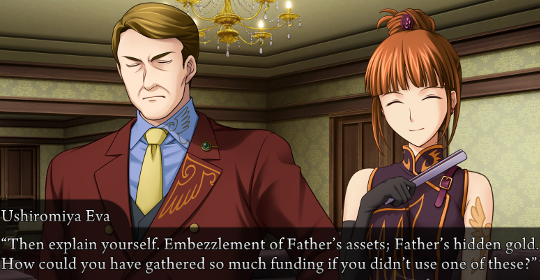
The accusers offer Krauss a way out: they will let him investigate father’s assets in return for admitting he found the gold, and giving them each a share. Apparently the 20 billion yen estimate of its value is dead on, since Krauss uses it without question. But to give Krauss an incentive, they say 50% of the gold should go to the successor to the Urishomiya main family, the rest split evenly between siblings, so Krauss would get 12.5 billion.
…except I can already see that is not ‘to Krauss’, but ‘to the successor’. There’s a motive for murderin’ if ever I saw one.
Of course, if the gold doesn’t actually exist, they’re basically demanding 2.5 billion each, with the threat to examine Kinzo’s finances if he doesn’t comply.
They additionally demand 10% of their portions within the next six months, whether or not Kinzo is dead.
Krauss summarises the actual deal being discussed so obliquely:
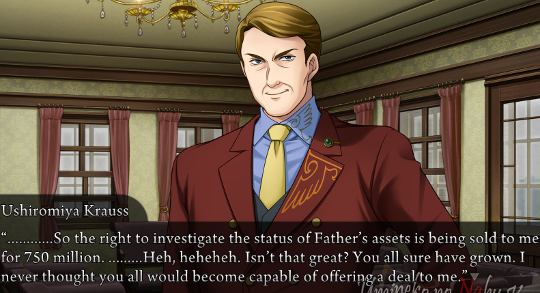
They also say the agreement will overrule Kinzo’s will, if he writes one.
Krauss agrees, because it would be an anticlimax if he didn’t, on the condition that if one of the other siblings finds the gold, they must turn it over to him. They accept, because clearly none of them actually believe this gold exists.
The narration steps in to explain what was pretty clear from the dialogue: they’re blackmailing him with the threat of doing him for embezzlement.
The narration then rather belabours the point that Krauss surely has a plan to get out of this. He insists on an amendment…
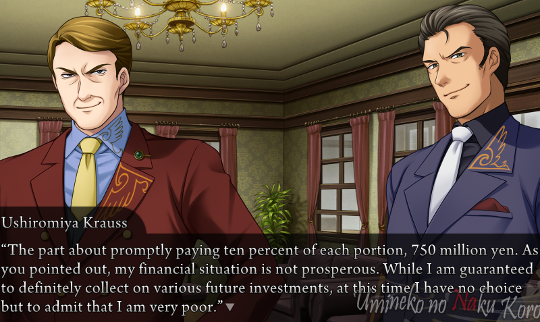
“I am very poor” says the man in the tailored suit in the mansion he lives in, and is redeveloping. My mum teaches horseriding, and some of her clients are disgustingly rich. Having strange notions of being “poor” is definitely in character.
Krauss hits back at Hideyoshi…
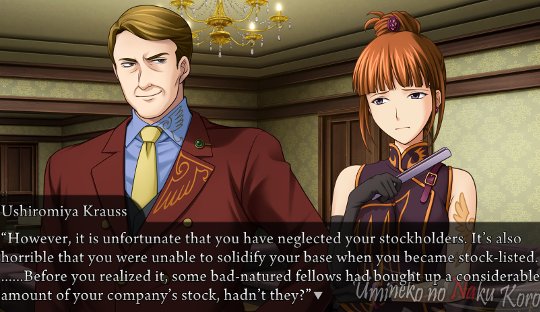
Gotta say, despite the tendency to belabour points, the author writes shady capitalist doubletalk extremely well.
In case you’re wondering, the narration takes the opportunity to explain that Hideyoshi runs a fast-food chain that he ‘started from nothing’. It also explains some things I didn’t really understand on the ‘how does capitalism’ front:
The greatest advantage of being in the stock-holding system is that, by selling stock certificates, a large amount of financing can be gained.
That amount is far greater than the actual profits from the business. This made it an extremely effective way to gather the massive funds needed to grow his company even further.
But stockholders have the right to interfere with the running of the company to protect their investment. The narration underlines that the stockholders can vote to replace the management, so if someone gains majority stock, they can seize the company.
The narration continues that companies defend themselves by having employees or other allies buy many stock certificates, but Hideyoshi failed to do this. Now someone is buying up stock trying to get the other stockholders on board with a takeover, and the stockholders have realised this and are demanding huge prices to prevent Hideyoshi from buying back stocks.
The narrator underlines the underlying point:

(this isn’t really a Marxist point necessarily, but like, I had to put him in there)
In short, as the game states in all capitals just in case we somehow missed the implication, Hideyoshi needs money very urgently.
Krauss moves on to target Rudolf, who’s apparently on trial for some kind of violation of rights in the States. (Employee rights? Sexual harassment?)
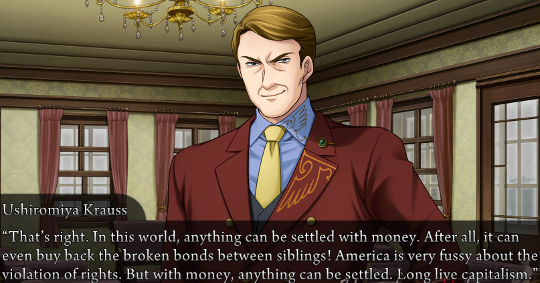
Do you think this game might be making a point?
Apparently a ‘corporate giant’ was accusing Rudolf’s nonspecific ‘niche’ company of ‘violating their rights’. The game is being unusually coy about the nature of this trial. In any case, Rudolf was being pressed to settle out of court. So he needs money too!
Or as the game puts it again…

And why does Rosa need money? She doesn’t play capital like the others, but she ‘cosigned’ something because of what Krauss calls her ‘softhearted nature’. The game doesn’t really explain.
So yeah, now Krauss has the upper hand, because he knows the more he stalls the more desperate the others get.
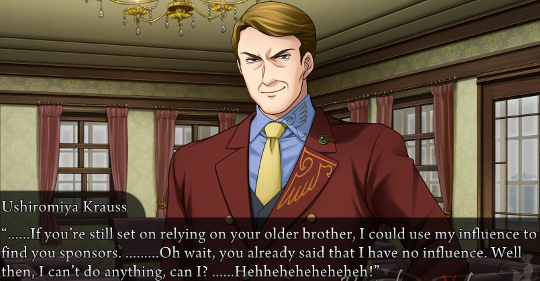
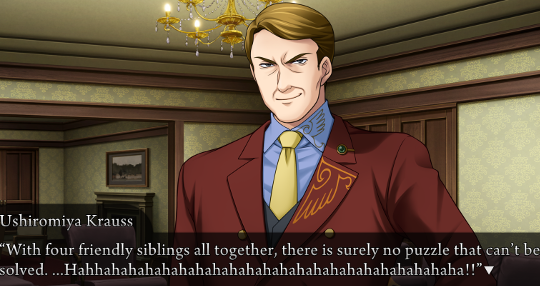
Krauss’s voice actor does some splendidly evil laughs.
We cut to Kanon, who is reporting on the negotiations to Kinzo in his study. Kinzo finds the whole thing amusing, and then starts talking about whether his ‘great miracle’ that will apparently resurrect Beatrice will come before they solve the riddle.
Apparently he put up the riddle to increase risk to him and therefore increase magic powers. It rather reminds me of that Discworld ‘one in a million’ thing. He claims the more people attempt the riddle, the more powerful his magic to resurrect Beatrice will be. He tells Kanon to attempt the riddle too.
Kanon repeats the “I am furniture” line when Kinzo offers him sweets. Kinzo doesn’t bother to tell him otherwise. Dick.
Downstairs, Nanjo and Genji are also discussing the riddle. We get the full riddle at last:
Behold the sweetfish river, running through my beloved home of old.
You who seek the Golden Land, follow its path downstream in search of the key.
- As you travel down it, you will see a village.
- In that village, look for the shore the two speak of.
- There the key to the Golden Land sleeps.
- You who laid hand upon the key must journey as follows to the Golden Land.
- On the first twilight, sacrifice the six chosen by the key.
- On the second twilight, those who remain shall tear apart the two who are close.
- On the third twilight, those who remain shall praise my noble name.
- On the fourth twilight, gouge the head and kill.
- On the fifth twilight, gouge the chest and kill.
- On the sixth twilight, gouge the stomach and kill.
- On the seventh twilight, gouge the knee and kill.
- On the eighth twilight, gouge the leg and kill.
- On the ninth twilight, the witch revives, and none shall be left alive.
- On the tenth twilight, the journey ends, and you shall reach the Home of the Gold.
- The witch shall praise the wise, and bestow four treasures.
Rest in peace, my beloved witch, Beatrice.
- One shall be all of the Golden Land’s gold.
- One resurrects all the dead people’s souls.
- One even revives all the love they possessed.
- And one for the rich to eternally rest.
Yeah, I can’t make head or tail of it lol.
Fortunately, the Cousin Gang knows more about Japanese rivers, and suchlike things. They’re probaby wrong about a lot at this point in the story. Still, speculation leads them to the Hayakawa river in Odawara where Kinzo grew up, and Odawara Castle at its mouth.
From there, Sogakishi in Odawara has the character for ‘shore’ in its name.
But then they doubt Odawara, because Kinzo was from a distant branch not touched by the Great Tokyo Earthquake.
Judging by the conversation here, the naration about Kinzo’s past probably wasn’t narrated by Battler, but by the omniscient narrator.
They go on to consider the rest. They count eleven sacrifices. For the record, this game has 19 named characters including Beatrice. They consider the rest of the described events.
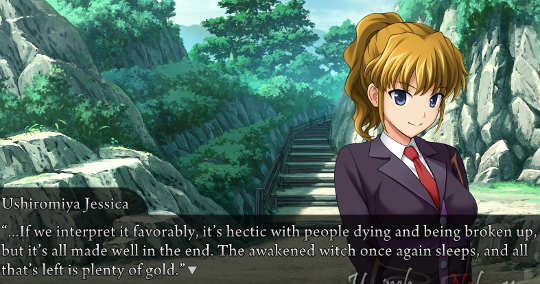
Maria shows everyone drawings of witches. She sounds like a budding comic artist. Maybe she’ll make the next big magical girl anime.
Shannon tells a Beatrice story that’s been passed down between the servants of Beatrice playing minor pranks. Battler makes sure to let us know how Very Skeptical he is, even if he’s trying to console Maria.
Maria gives Battler and Jessica magic protection charms. Battler has to tell us how he thinks they’re cheap and plastic. He manages to suppress his inner jerk and avoid arguing with Maria, and accepts the emerald-scorpion anti-magic charm.
Shannon is making friends with the Cousin Gang at least. She seems to be in a bit better spirits.
They go in as the weather worsens, and we get a protracted scene of searching for a particular rose to satisfy Maria. She’s a convincing small child, for sure. Rosa joins them and is so messed up by the intense negotiations earlier that she takes it out on Maria, hits her, and says some very cruel things. Battler tries to intervene (I guess he can be an OK guy sometimes) and Rosa tells them all to piss off. Battler intervenes again when she starts to seriously hurt Maria, and takes some of Rosa’s anger, superficially about Maria’s manner of speech.
George, incomprehensibly, takes Rosa’s side - calm as ever but clearly not caring about the actual physical violence? I realise it’s only recently that corporal punishment of children has become taboo and maybe it’s a societal thing, but when an adult is beating up a nine-year-old who cares about the reasons?
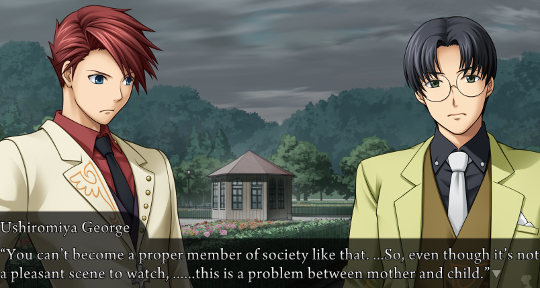
go-fuck-yourself-george.png
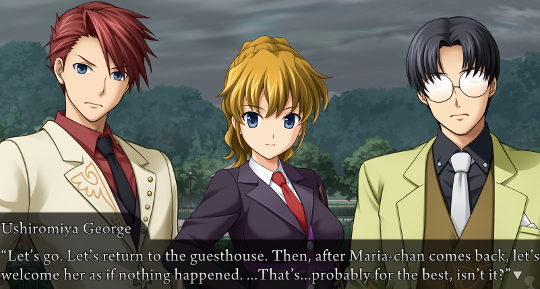
Refusing to acknowledge that someone is being abused always helps, definitely.
After talking about the attempted sexual assault scene with @alchymistryandcoldsteel, I no longer assume the author intends these characters to read sympathetically. Instead I think he’s making a point about how abuse is enabled by social structures and engenders futher abuse, and expect as Battler’s character is developed he’ll see these ideas challenged.

Already, this is blatantly presented as rationalisation for an immoral choice.
Comments